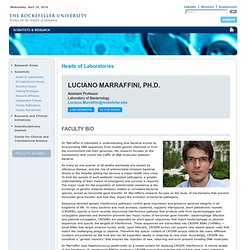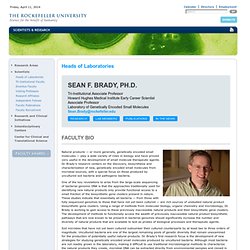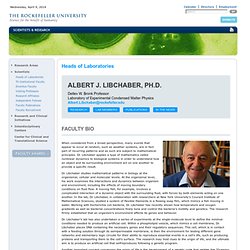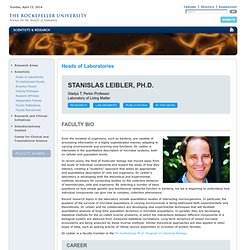

The Rockefeller University » Scientists & Research. Dr.

Marraffini is interested in understanding how bacteria evolve by incorporating DNA sequences from mobile genetic elements or from the environment into their genomes. His research focuses on the mechanisms that control the traffic of DNA molecules between bacteria. As many as one quarter of all deaths worldwide are caused by infectious disease, and the rise of antimicrobial-resistant bacterial strains in the hospital setting has become a major health care crisis. To limit the spread of such antibiotic-resistant pathogens, a greater understanding of their means of emergence and survival is required. The major route for the acquisition of antimicrobial resistance is the exchange of genetic material between related or unrelated bacterial species, known as horizontal gene transfer.
Sequence-directed genetic interference pathways control gene expression and preserve genome integrity in all kingdoms of life. The Rockefeller University » Scientists & Research. Natural products — or more generally, genetically encoded small molecules — play a wide variety of roles in biology and have proved very useful in the development of small molecule therapeutic agents.

Dr. Brady’s research centers on the discovery, biosynthesis and characterization of new, genetically encoded small molecules from microbial sources, with a special focus on those produced by uncultured soil bacteria and pathogenic bacteria. One of the key revelations to arise from the large-scale sequencing of bacterial genomic DNA is that the approaches traditionally used for identifying new natural products only provide functional access to a small fraction of the biosynthetic gene clusters present in nature. These studies indicate that essentially all bacteria — from those with fully sequenced genomes to those that have not yet been cultured — are rich sources of unstudied natural product biosynthetic gene clusters. The Rockefeller University » Scientists & Research. When considered from a broad perspective, many events that appear to occur at random, such as weather systems, are in fact part of recurring patterns and as such are subject to mathematical principles.

Dr. Libchaber applies a type of mathematics called nonlinear dynamics to biological systems in order to understand how an object and its surrounding environment act on one another to provide a specific result. Dr. Libchaber studies mathematical patterns in biology at the organismal, cellular and molecular levels. At the organismal level, his work examines the interactions and dynamics between organism and environment, including the effects of moving boundary conditions on fluid flow.
Dr. Another important concept concerning the origin of life is the development of a genetic code that relates the 20-amino acid world to the four-nucleotide one. Past research in Dr. Born in Paris, Dr. The Rockefeller University » Scientists & Research. Even the simplest of organisms, such as bacteria, are capable of processing information in a highly sophisticated manner, adapting to varying environments and evolving new functions.

Dr. Leibler is interested in the quantitative description of microbial systems, both on cellular and population levels. In recent years, the field of molecular biology has moved away from the study of individual components and toward the study of how they interact, creating a “systemic” approach that seeks an appropriate and quantitative description of cells and organisms.
Dr. Leibler’s laboratory is developing both the theoretical and experimental methods necessary for conducting studies on the collective behavior of biomolecules, cells and organisms. Recent research topics in the laboratory include quantitative studies of interacting microorganisms. Dr. Dr. During his last year at Princeton, from 2000 to 2001, Dr.